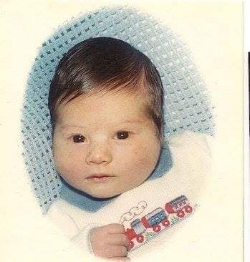Thirty-four years ago, this young man was born into a difficult world with a slew of problems. He couldn't catch a break. His first few years he struggled with upper respiratory infections, pneumonia, infectious croup, and bronchitis. He spent a great amount of time in and out of hospitals.
By age four, he had a developmental team working with him and was diagnosed with neuro-motor disability and learning disabilities. The doctors agreed this stemmed from injuries at birth. Mitchel was lifeless when he was born and had to be resuscitated. They (the docs) believed part of his brain had been damaged, even though the spinal tap done on my newborn baby came back inconclusive.
Skipping ahead to grade school, Mitchel was in special needs classes and did best when he was with a teacher one on one. If that schedule became disrupted he couldn't function. At the same time, Mitchel's gross motor skills were taking many years to develop. When riding a bike, peddling, or doing anything that required these skills, he became distraught.
Skipping ahead to high school, Mitchel’s paranoia started. He was afraid to enter the school for fear of getting lost and not being able to find his way around. I finally decided to look into an alternative high school for my boy. This was the best decision for him. He still struggled but not nearly as much.
At age 18, Mitchell joined the United States Army and other symptoms began to show — delusions, psychosis, paranoia, anxiety. I lumped it all into the fact that he was getting ready to leave for boot camp. But that wasn't the actual case. Mitchel made it through boot camp and was sent to Kentucky where he turned up missing. AWOL.
Mitchel lived, homeless, in Washington State and Los Angeles — underneath bridges and behind dumpsters. Two years passed before I saw him, again, in person. I didn't recognize him. His hair had grown down his back, he smelled terrible, and he was wearing two different shoes that looked like he'd found them in a trash can.
Moving ahead, we received the diagnosis of paranoid schizophrenia after an extensive psychological evaluation. Puzzle pieces began fitting together. Things started making sense. For me, anyway.
These past ten years have been brutal on all of us. My girls didn’t have their brother to dance with at their weddings or, now, to shoot the shit with in general.
Hospitalization is much better than jail. Mitchel has been an inpatient since 2012 with a brief discharge, last summer, for about three months. We want, more than anything, for him to get better and we know it's possible his symptoms could go away, at least for a short time. We've seen it happen before. The scary part is not knowing where or when the symptoms will return. And we know they will. Eventually.
Another year of not getting to spend a birthday with my baby boy. He's 34. He was 25 when he was admitted to Utah State Hospital. Time and schizophrenia have been cruel to Mitchel John.
Happy birthday, sweet boy. I love you forever.
Note: On November 6, Sherry and her family were able to spend time with Mitchel to celebrate his birthday — one month late.
Mitchel John

